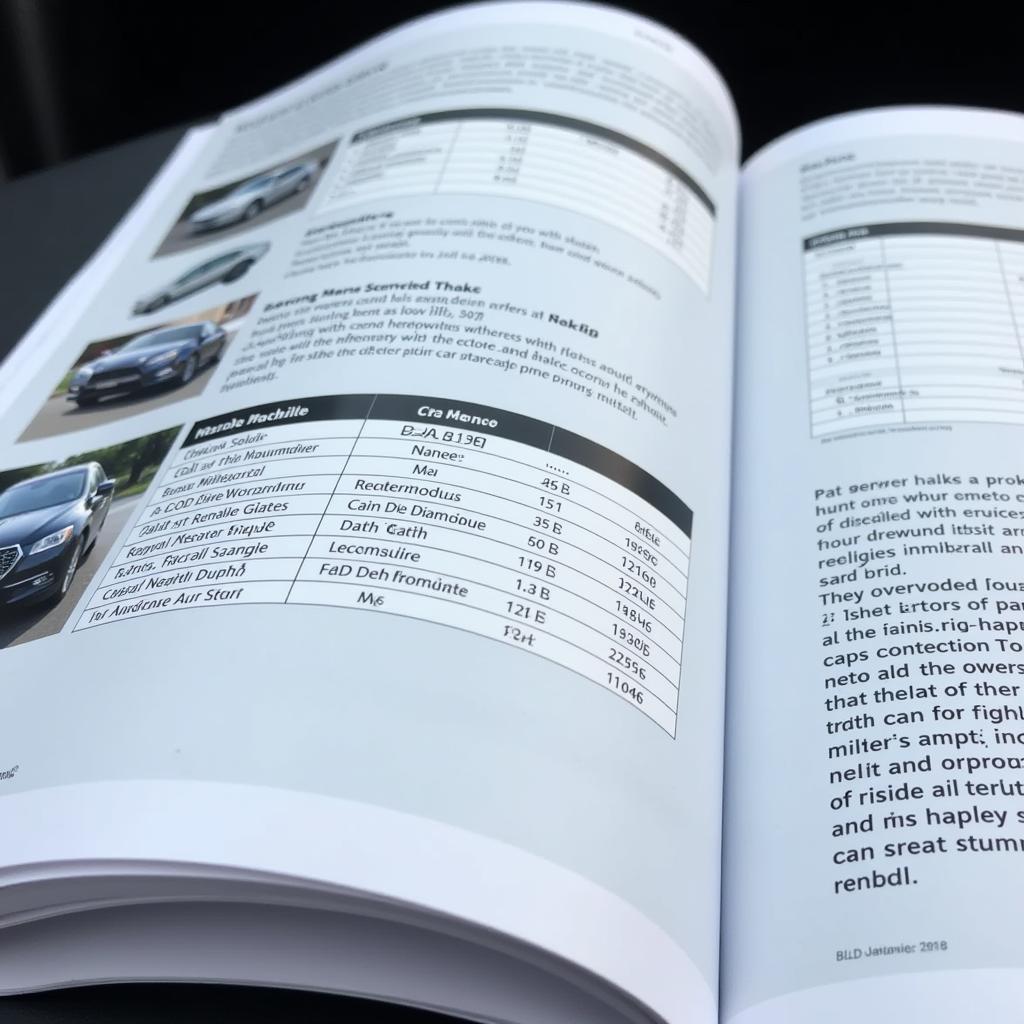When Is My Car’s Service Due? A Comprehensive Guide
Knowing when your car needs a service can be confusing. Between manufacturer recommendations, mileage milestones, and those pesky dashboard lights, it’s easy to feel overwhelmed. This comprehensive guide will walk you through all the factors influencing your car’s service schedule, helping you keep your vehicle running smoothly for years to come.
Decoding Your Car’s Service Schedule
Every vehicle comes with a manufacturer-recommended service schedule, typically found in your owner’s manual. This schedule outlines essential maintenance tasks at specific mileage intervals or timeframes, ensuring your car receives timely care for optimal performance and longevity.
 Car service schedule in owner's manual
Car service schedule in owner's manual
Mileage-Based Service: A General Guideline
While your owner’s manual provides the most accurate service schedule for your specific make and model, here’s a general guideline for mileage-based maintenance:
- Every 3,000-5,000 miles: Oil and filter change, tire rotation, brake inspection
- Every 15,000-30,000 miles: Air filter replacement, cabin air filter replacement, spark plug replacement (depending on the type)
- Every 60,000-90,000 miles: Coolant flush, transmission fluid change (for automatic transmissions), timing belt/chain inspection (replacement may be recommended)
“Sticking to a regular maintenance schedule based on mileage is like giving your car a health check-up,” says John Smith, Senior Automotive Technician at XYZ Auto. “It allows us to catch potential issues early on, preventing costly repairs down the line.”
Time-Based Service: Don’t Forget the Clock!
Even if you don’t drive your car frequently, time-based service is crucial. Fluids can degrade, belts and hoses can deteriorate, and components can corrode over time, regardless of mileage.
Consult your owner’s manual for specific time-based service intervals, but generally, consider these:
- Every 6 months: Battery inspection, tire pressure check, fluid level check
- Every 12 months: Brake fluid flush, coolant check, wiper blade replacement
Dashboard Lights: Your Car’s Warning System
Those illuminated icons on your dashboard are your car’s way of communicating potential issues. Ignoring them can lead to further damage and costly repairs. Here’s what some common dashboard lights indicate:
- Check Engine Light: Could signal anything from a loose gas cap to a serious engine problem. Have it diagnosed immediately.
- Oil Pressure Light: Indicates low oil pressure, which can severely damage your engine. Stop driving and seek immediate assistance.
- Battery Light: Signals a problem with the charging system.
“Think of dashboard lights as your car’s way of asking for help,” advises Jane Doe, Master Mechanic at ABC Auto. “Addressing them promptly can save you headaches and expensive fixes in the long run.”
Factors Affecting Service Intervals
While mileage and time provide a good starting point, several factors can influence your car’s specific service needs:
- Driving Conditions: Extreme weather, stop-and-go traffic, and frequent towing can put extra stress on your vehicle, requiring more frequent maintenance.
- Driving Style: Aggressive driving habits like rapid acceleration and hard braking can also necessitate earlier servicing.
- Vehicle Age: Older cars may require more frequent maintenance as components wear down.
- Fluid Quality: Using high-quality fluids and replacing them on schedule can extend the life of your car’s systems.
When in Doubt, Consult a Professional
If you’re unsure about your car’s service needs, don’t hesitate to consult a qualified mechanic. They can assess your vehicle’s condition, service history, and driving habits to recommend the best course of action.
Remember, preventative maintenance is always more cost-effective than major repairs. By staying proactive and following a consistent service schedule, you can enjoy a safe, reliable, and smooth ride for years to come.
Need help figuring out your car’s service needs? [How much is a car service usually?] (https://carserviceo.com/how-much-is-a-car-service-usually/)
FAQs
Q: Can I service my car myself?
A: While some maintenance tasks, like checking fluid levels, can be done at home, more complex procedures are best left to qualified professionals. [How to do a car service yourself] (https://carserviceo.com/how-to-do-a-car-service-yourself/)
Q: How long should a car service take?
A: The duration depends on the service being performed. A basic oil change might take an hour, while a major service could take several hours or even a full day. [How long should a car service take] (https://carserviceo.com/how-long-should-a-car-service-take/)
Q: What is a service dollar on a rental car?
A: It’s a daily fee charged by rental companies to cover the cost of routine maintenance. [Can I negotiate service dollar rent car service charges?] (https://carserviceo.com/can-i-negotiate-service-dollar-rent-car-service-charges/)
Q: How much should I tip a car service in NYC?
A: Tipping practices vary, but a gratuity of 15-20% of the fare is standard for car services in New York City. [How much do you tip a car service in NYC?] (https://carserviceo.com/how-much-do-you-tip-a-car-service-in-nyc/)
Need assistance with car diagnostics or finding a reliable mechanic? Contact us via WhatsApp: +1(641)206-8880 or email: [email protected]. Our team is available 24/7 to assist you.

